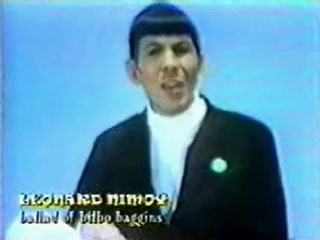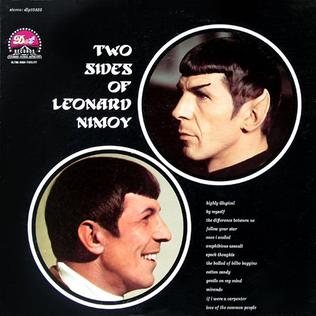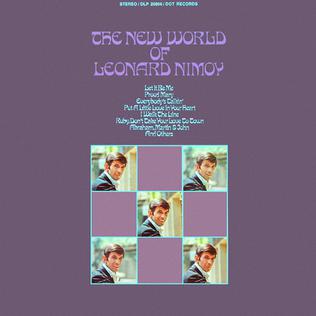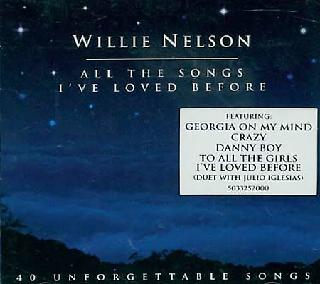
Vulcans, sometimes referred to as Vulcanians, are a fictional extraterrestrial humanoid species in the Star Trek universe and media franchise. In the various Star Trek television series and films, they are noted for their attempt to live by logic and reason with as little interference from emotion as possible. Known for their pronounced eyebrows and pointed ears, they originate from the fictional planet Vulcan. In the Star Trek universe, they were the first extraterrestrial species to make contact with humans.

Leonard Simon Nimoy was an American actor, famed for playing Spock in the Star Trek franchise for almost 50 years. This includes originating Spock in the original Star Trek series in 1966, then Star Trek: The Animated Series, the first six Star Trek films, and Star Trek: The Next Generation. Nimoy also directed films, including Star Trek III: The Search for Spock (1984) and Star Trek IV: The Voyage Home (1986), and appeared in several films, television shows, and voice acted in several video games. Outside of acting, Nimoy was a film director, photographer, author, singer, and songwriter.

Spock is a fictional character in the Star Trek media franchise. He first appeared in the original Star Trek series serving aboard the starship USS Enterprise as science officer and first officer and later as commanding officer of the vessel. Spock's mixed human-Vulcan heritage serves as an important plot element in many of the character's appearances. Along with Captain James T. Kirk and Dr. Leonard "Bones" McCoy, he is one of the three central characters in the original Star Trek series and its films. After retiring from active duty in Starfleet, Spock served as a Federation ambassador, and later became involved in the ill-fated attempt to save Romulus from a supernova, leading him to live out the rest of his life in a parallel universe.

Star Trek IV: The Voyage Home is a 1986 American science fiction film directed by Leonard Nimoy and based on the television series Star Trek. It is the fourth feature installment in the Star Trek franchise, and is a sequel to Star Trek III: The Search for Spock (1984); it completes the story arc begun in Star Trek II: The Wrath of Khan (1982) and continued in The Search for Spock. Intent on returning home to Earth to face trial for their actions in the previous film, the former crew of the USS Enterprise finds the planet in grave danger from an alien probe attempting to contact now-extinct humpback whales. The crew travel to Earth's past to find whales who can answer the probe's call.

Dot Records was an American record label founded by Randy Wood and Gene Nobles that was active between 1950 and 1978. The original headquarters of Dot Records were in Gallatin, Tennessee. In its early years, Dot specialized in artists from Tennessee. Then it branched out to include musicians from across the U.S. It recorded country music, rhythm and blues, polkas, waltzes, gospel, rockabilly, pop, and early rock and roll.

In the fictional Star Trek universe, the Vulcan nerve pinch is a fictional technique used mainly by Vulcans to render unconsciousness by pinching a pressure point at the base of the victim's neck.

"The Ballad of Bilbo Baggins" is a song composed by Charles Randolph Grean and performed by Leonard Nimoy, telling the story of Bilbo Baggins and his adventures in J. R. R. Tolkien's 1937 novel The Hobbit. The recording was featured on the 1968 album Two Sides of Leonard Nimoy, the second of Nimoy's albums on Dot Records. It was also released as a single in July 1967, backed with a "modern thought-image" folk song called "Cotton Candy".

Highly Illogical is an album which contains a collection of songs performed by Star Trek actor Leonard Nimoy. Most of the songs were originally recorded in the 1960s. The collection includes "The Ballad of Bilbo Baggins", which tells the story of J.R.R. Tolkien's book The Hobbit, and has been included on various novelty compilations.

The discography of American actor Leonard Nimoy consists of 5 studio albums and 4 compilations.
Golden Throats is Rhino Records' series of humorous compilations of critically lambasted cover versions of songs, performed mostly either by celebrities known for something other than musical talent or musicians not known for the genre from which the song they are covering comes.

Adam B. Nimoy is an American television director. He is the son of actors Leonard Nimoy and Sandra Zober.

Love, Power, Peace: Live at the Olympia, Paris, 1971 is a live album by James Brown. It is the only recording that documents one of his live performances with the original J.B.'s lineup featuring Bootsy and Catfish Collins. Love, Power, Peace was originally intended for a 1972 release as a vinyl triple album, but was cancelled after the key members of the original J.B.'s left Brown to join Parliament-Funkadelic. The album was finally released for the first time in 1992, edited down for a single compact disc; the full show, using Brown's original mixdown was later released in July 2014 on Sundazed Records.

Two Sides of Leonard Nimoy is Leonard Nimoy's second album released shortly after Music from Outer Space. It was released in early 1968 by Dot Records and reached 97 on the US album chart.

Leonard Nimoy Presents Mr. Spock's Music from Outer Space is the debut album of Leonard Nimoy, recorded in character as Mr. Spock from the NBC TV series Star Trek. It was released in April 1967 by Dot Records and reached number 83 on the Billboard 200.

The Touch of Leonard Nimoy is the fourth studio album released from Leonard Nimoy. The album was released in 1969, on Dot Records.

The New World of Leonard Nimoy is the fifth and final album of Leonard Nimoy. Dot Records released the album in June 1970.

All the Songs I've Loved Before: 40 Unforgettable Songs is a compilation album by country singer Willie Nelson, released in 2001. This album was successful in Sweden, New Zealand and Australia - in each country it has sold about 30 000 copies, so it has sold nearly 150.000 worldwide.
Seymour "Cy" Coben was an American songwriter, whose hits were recorded by bandleaders, country singers, and other artists such as The Beatles, Tommy Cooper and Leonard Nimoy.

Mind Meld: Secrets Behind the Voyage of a Lifetime is a 2001 American documentary film in which actors William Shatner and Leonard Nimoy discuss the Star Trek science fiction franchise and its effects on their lives. Shatner and Nimoy portrayed the characters James T. Kirk and Spock respectively in the 1960s Star Trek television series, the 1970s animated television series, and their film sequels.

The development of Spock, a fictional character first introduced in the American science fiction television series Star Trek, began prior to the start of the series. The first known mention of Spock was in a discussion between Gene Roddenberry and Gary Lockwood, where the latter suggested Leonard Nimoy for the role. Roddenberry agreed with the suggestion, and Nimoy became the first choice actor for the part. However, Roddenberry was required to audition other actors for the role. It was offered to both DeForest Kelley and Martin Landau before Nimoy. Nimoy disliked the prosthetic ears he was required to wear, and there were concerns from the studio that they made him appear satanic. Roddenberry fought to keep the character in the second pilot, "Where No Man Has Gone Before" after the rest of the main cast was dropped from the initial pilot, "The Cage".

















